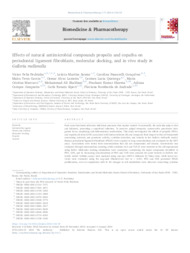Effects of natural antimicrobial compounds propolis and copaiba on periodontal ligament fibroblasts, molecular docking, and in vivo study in Galleria mellonella.
Effects of natural antimicrobial compounds propolis and copaiba on periodontal ligament fibroblasts, molecular docking, and in vivo study in Galleria mellonella.
Autoria: PEDRINHA, V. F.; SANTOS, L. M.; GONÇALVES, C. P.; GARCIA, M. T.; LAMEIRA, O. A.; QUEIROGA, C. L.; MARCUCCI, M. C.; SHAHBAZI, M.-A.; SHARMA, P. K.; JUNQUEIRA, J. C.; SIPERT, C. R.; ANDRADE, F. B. de
Resumo: Root canal treatment addresses infectious processes that require control. Occasionally, the radicular pulp is vital and inflamed, presenting a superficial infection. To preserve pulpal remnants, conservative procedures have gained favor, employing anti-inflammatory medications. This study investigated the effects of propolis (PRO), and copaiba oil-resin (COR) associated with hydrocortisone (H) and compared their impact to that of Otosporin® concerning cytotoxic and genotoxic activity, cytokine detection, and toxicity in the Galleria mellonella model. Human periodontal ligament fibroblasts (PDLFs) were exposed to drug concentrations and evaluated by the MTT assay. Associations were tested from concentrations that did not compromise cell density. Genotoxicity was evaluated through micronucleus counting, while cytokines IL-6 and TGF-?1 were detected in the cell supernatant using ELISA. Molecular docking simulations were conducted, considering the major compounds identified in PRO, COR, and H. Increasing concentrations of PRO and COR were assessed for acute toxicity in Galleria mellonella model. Cellular assays were analyzed using one-way ANOVA followed by Tukey tests, while larval survivals were evaluated using the Log-rank (Mantel-Cox) test (? = 0.05). PRO and COR promoted PDLFs proliferation, even in conjunction with H. No changes in cell metabolism were observed concerning cytokine
Ano de publicação: 2024
Tipo de publicação: Artigo de periódico
Unidade: Embrapa Amazônia Oriental
Palavras-chave: Ancoragem molecular, Doenças da polpa dentária, Própolis, Toxicidade, Toxicity
Observações
1 - Por padrão são exibidas publicações dos últimos 20 anos. Para encontrar publicações mais antigas, configure o filtro ano de publicação, colocando o ano a partir do qual você deseja encontrar publicações. O filtro está na coluna da esquerda na busca acima.
2 - Para ler algumas publicações da Embrapa (apenas as que estão em formato ePub), é necessário ter, no celular ou computador, um desses softwares gratuitos. Sistemas Android: Google Play Livros; IOS: iBooks; Windows e Linux: software Calibre.
Acesse outras publicações
Acesse a Base de Dados da Pesquisa Agropecuária (BDPA) para consultar o acervo completo das bibliotecas da Embrapa.

